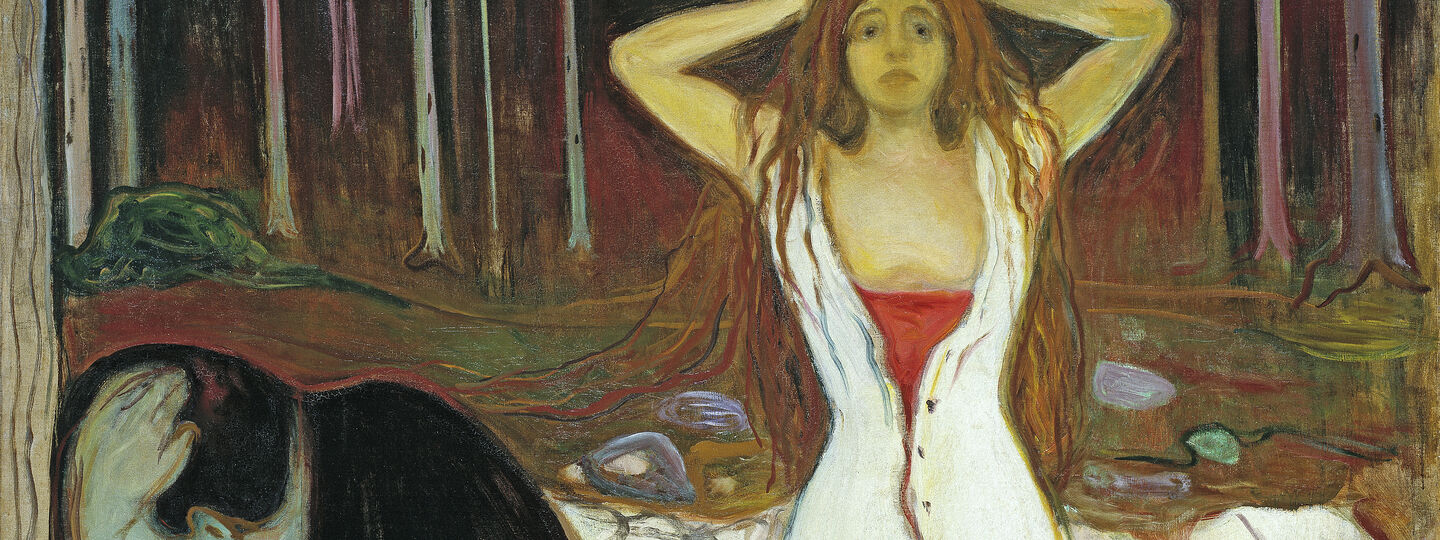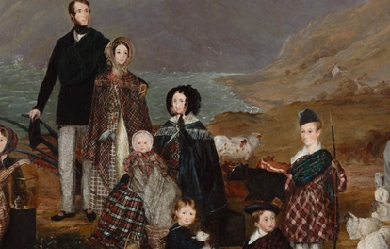
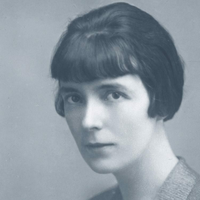
Kathleen Mansfield Murry (14 October 1888– 9 January 1923) was a prominent New Zealand modernist short story writer who was born and brought up in colonial New Zealand and wrote under the pen name of Katherine Mansfield. At 19, Mansfield left New Zealand and settled in the United Kingdom, where she became a friend of modernist writers such as D.H. Lawrence and Virginia Woolf. In 1917 she was diagnosed with extrapulmonary tuberculosis, which led to her death at the age of 34. Biography Early life Mansfield was born Kathleen Mansfield Beauchamp in 1888 into a socially prominent family in Wellington, New Zealand. Her father was a banker and she was a cousin of the author Countess Elizabeth von Arnim. She had two older sisters, a younger sister and a younger brother, born in 1894. Her father, Harold Beauchamp, became the chairman of the Bank of New Zealand and was knighted. Her grandfather was Arthur Beauchamp, who briefly represented the Picton electorate in Parliament. In 1893 the Mansfield family moved from Thorndon to Karori, where Mansfield spent the happiest years of her childhood. She used some of her memories of this time as an inspiration for the “Prelude” story. Her first published stories appeared in the High School Reporter and the Wellington Girls’ High School magazine (the family returned to Wellington proper in 1898), in 1898 and 1899. In 1902 she became enamoured of a cellist, Arnold Trowell, although the feelings were largely unreciprocated. Mansfield herself was an accomplished cellist, having received lessons from Trowell’s father. Mansfield wrote in her journals of feeling alienated in New Zealand, and of how she had become disillusioned because of the repression of the Māori people. Māori characters are often portrayed in a sympathetic or positive light in her later stories, such as “How Pearl Button Was Kidnapped”. In 1903 she moved to London, where she attended Queen’s College along with her sisters. Mansfield recommenced playing the cello, an occupation that she believed she would take up professionally, but she also began contributing to the college newspaper with such dedication that she eventually became its editor. She was particularly interested in the works of the French Symbolists and Oscar Wilde, and she was appreciated among her peers for her vivacious and charismatic approach to life and work. She met fellow writer Ida Baker (also known as Lesley Moore), a South African, at the college, and they became lifelong friends. Mansfield did not become involved in much political activity when she lived in London. For example, she did not actively support the suffragette movement in the UK (women in New Zealand had gained the right to vote in 1893). Mansfield travelled in continental Europe between 1903 and 1906, staying mainly in Belgium and Germany. After finishing her schooling in England, she returned to New Zealand in 1906, and only then began to write short stories. She had several works published in the Native Companion (Australia), her first paid writing work, and by this time she had her heart set on becoming a professional writer. It was also the first occasion on which she used the pseudonym “K. Mansfield”. She rapidly wearied of the provincial New Zealand lifestyle and of her family, and two years later headed again for London. Her father sent her an annual allowance of 100 pounds for the rest of her life. In later years she expressed both admiration and disdain for New Zealand in her journals, but she was never able to return there because of her tuberculosis. Mansfield had two romantic relationships with women that are notable for their pre-eminence in her journal entries. She continued to have male lovers, and attempted to repress her feelings at certain times. Her first same-gender romantic relationship was with Maata Mahupuku (sometimes known as Martha Grace), a wealthy young Māori woman whom she had first met at Miss Swainson’s school in Wellington, and then again in London in 1906. In June 1907 she wrote: “I want Maata—I want her as I have had her—terribly. This is unclean I know but true.” She often referred to Maata as Carlotta. She wrote about Maata in several short stories. Maata married in 1907 but it is claimed that she sent money to Mansfield in London. The second relationship, with Edith Kathleen Bendall, took place from 1906 to 1908. Mansfield also professed her adoration for her in her journals. Return to London Back in London in 1908, Mansfield quickly fell into a bohemian way of life. She published only one story and one poem during her first 15 months there. Mansfield sought out the Trowell family for companionship, and while Arnold was involved with another woman Mansfield embarked on a passionate affair with his brother, Garnet. By early 1909 she had become pregnant by Garnet, though Trowell’s parents disapproved of the relationship and the two broke up. She hastily entered into a marriage with George Bowden, a singing teacher 11 years older than she; they were married on 2 March, but she left him the same evening, before the marriage could be consummated. After a brief reunion with Garnet, Mansfield’s mother, Annie Beauchamp, arrived in 1909. She blamed the breakdown of the marriage to Bowden on a lesbian relationship between Mansfield and Baker, and she quickly had her daughter despatched to the spa town of Bad Wörishofen in Bavaria, Germany. Mansfield miscarried after attempting to lift a suitcase on top of a cupboard. It is not known whether her mother knew of this miscarriage when she left shortly after arriving in Germany, but she cut Mansfield out of her will. Mansfield’s time in Bavaria had a significant effect on her literary outlook. In particular, she was introduced to the works of Anton Chekhov. She returned to London in January 1910. She then published more than a dozen articles in A.R. Orage’s socialist magazine The New Age, and became a friend and lover of Beatrice Hastings, who lived with Orage. Her experiences of Germany formed the foundation of her first published collection, In a German Pension, (1911), which she later described as “immature”. Meeting Murry Soon afterwards Mansfield submitted a lightweight story to a new avant-garde magazine called Rhythm. The piece was rejected by the magazine’s editor, John Middleton Murry, who requested something darker. Mansfield responded with “The Woman at the Store”, a tale of murder and mental illness. Mansfield was inspired at this time by Fauvism. In 1911 Mansfield and Murry began a relationship that culminated in their marriage in 1918, although she left him twice, in 1911 and 1913. In October 1912 the publisher of Rhythm, Charles Granville (sometimes known as Stephen Swift), absconded to Europe and left Murry responsible for the debts the magazine had accumulated. Mansfield pledged her father’s allowance towards the magazine, but it was discontinued, being reorganised as The Blue Review in 1913 and folding after three issues. Mansfield and Murry were persuaded by their friend Gilbert Cannan to rent a cottage next to his windmill in Cholesbury, Buckinghamshire in 1913, in an attempt to alleviate Mansfield’s ill health. In January 1914 the couple moved to Paris, in the hope that a change of setting would make writing easier for both of them. Mansfield wrote only one story during her time there ("Something Childish But Very Natural") before Murry was recalled to London to declare bankruptcy. In 1914 Mansfield had a brief affair with the French writer Francis Carco. Her visit to him in Paris in February 1915 is retold in one of her short stories, “An Indiscreet Journey”. Mansfield’s life and work were changed by the death in 1915 of her beloved younger brother, Leslie Heron “Chummie” Beauchamp, as a New Zealand soldier in France. She began to take refuge in nostalgic reminiscences of their childhood in New Zealand. In a poem describing a dream she had shortly after his death, she wrote By the remembered stream my brother stands Waiting for me with berries in his hands... “These are my body. Sister, take and eat.” At the beginning of 1917 Mansfield and Murry separated, although he continued to visit her at her new apartment. Baker, whom Mansfield often called, with a mixture of affection and disdain, her “wife”, moved in with her shortly afterwards. Mansfield entered into her most prolific period of writing after 1916, which began with several stories, including “Mr Reginald Peacock’s Day” and “A Dill Pickle”, being published in The New Age. Woolf and her husband, Leonard, who had recently set up Hogarth Press, approached her for a story, and Mansfield presented “Prelude”, which she had begun writing in 1915 as “The Aloe”. The story depicts a family of New Zealanders moving house. In December 1917 Mansfield was diagnosed with tuberculosis. Rejecting the idea of staying in a sanatorium on the grounds that it would cut her off from writing, she moved abroad to avoid the English winter. She stayed at a half-deserted and cold hotel in Bandol, France, where she became depressed but continued to produce stories, including "Je ne parle pas français". “Bliss”, the story that lent its name to her second collection of stories in 1920, was also published in 1918. Her health continued to deteriorate and she had her first lung haemorrhage in March. By April Mansfield’s divorce from Bowden had been finalised, and she and Murry married, only to part again two weeks later. They came together again, however, and in March 1919 Murry became editor of Athenaeum, for which Mansfield wrote more than 100 book reviews, collected posthumously as Novels and Novelists. During the winter of 1918–19 she and Baker stayed in a villa in San Remo, Italy. Their relationship came under strain during this period, and after she wrote to Murry to express her feelings of depression he stayed over Christmas. Although her relationship with Murry became increasingly distant after 1918 and the two often lived apart, this intervention of his spurred her on, and she wrote “The Man Without a Temperament”, the story of an ill wife and her long-suffering husband. Mansfield followed her first collection of short stories, Bliss (1920), with another collection The Garden Party, published in 1922. Final years Mansfield spent her last years seeking increasingly unorthodox cures for her tuberculosis. In February 1922 she consulted the Russian physician Ivan Manoukhin, whose “revolutionary” treatment, which consisted of bombarding her spleen with X-rays, caused Mansfield to develop heat flashes and numbness in her legs. In October 1922 Mansfield moved to Georges Gurdjieff’s Institute for the Harmonious Development of Man in Fontainebleau, France, where she was put under the care of Olgivanna Lazovitch Hinzenburg (who later married Frank Lloyd Wright). As a guest rather than a pupil of Gurdjieff, Mansfield was not required to take part in the rigorous routine of the Institute, but she spent much of her time there with her mentor, Alfred Richard Orage and her last letters inform Murry of her attempts to apply some of Gurdjieff’s teachings to her own life. Mansfield suffered a fatal pulmonary haemorrhage in January 1923, after running up a flight of stairs. She died on 9 January and was buried in a cemetery in Avon. Mansfield was a prolific writer in the final years of her life. Much of her work remained unpublished at her death, and Murry took on the task of editing and publishing it in two additional volumes of short stories (The Dove’s Nest in 1923 and Something Childish in 1924), a volume of Poems, The Aloe, Novels and Novelists, and collections of her letters and journals. Legacy The following high schools in New Zealand have a house named after her: Rangitoto College, Westlake Girls’ High School, Macleans College all in Auckland, Tauranga Girls’ College in Tauranga, Wellington Girls’ College in Wellington, Rangiora High School in North Canterbury and Southland Girls’ High School in Invercargill. She has been honoured at Karori Normal School in Wellington which has a stone monument dedicated to her with a plaque commemorating her work and her time at the school. She has also been recognised at Samuel Marsden Collegiate School (previously Fitzherbert Tce School) with a painting and award in her name. There is a Park dedicated to her in Thorndon, Wellington. A street in Menton, France, where she lived and wrote, is named after her and a Fellowship is offered annually to enable a New Zealand writer to work at her former home, the Villa Isola Bella. New Zealand’s pre-eminent short story competition is also named in her honour. She was the subject of the 1973 BBC miniseries A Picture of Katherine Mansfield starring Vanessa Redgrave. The six-part series included adaptations of Mansfield’s life and of her short stories. In 2011, a biopic film titled “Bliss”, was made of her early beginnings as a writer in New Zealand, played by Kate Elliott and featured on the TVNZ TV-movie series “Sunday Theatre” that aired on 28 August 2011.
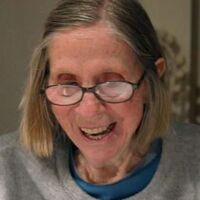
In 1920, Barbara Guest was born in Wilmington, North Carolina. She attended the University of California, Los Angeles, and the University of California, Berkeley, from which she graduated in 1943. Early in her career, she was known predominantly as a writer of the New York School, a group of poets that included John Ashbery, Kenneth Koch, Frank O'Hara, and James Schuyler. The New York School represented a rejection of the dominant school of confessional poetry and was deeply influenced by the action painters of the 1950s and 1960s, particularly Jackson Pollock, Willem de Kooning, and Larry Rivers. Throughout the 1950s, Guest worked as a writer for Art News magazine, and she has continued to write articles and reviews for many art magazines. The tension between the lyrical (or musical) and the graphic (or material) is a defining feature of her work, and her poetry often utilizes space as a way to draw attention to language. Guest has published numerous collections of poetry, among them The Red Gaze (Wesleyan University Press, 2005); Miniatures and Other Poems (2002), Symbiosis (1999), Defensive Rapture (1994), Fair Realism (1989), Musicality (1988), The Nude (1986), Quilts (1980), and Biography (1980). She is also the author of several plays and a novel, Seeking Air (1978). Her honors include the Robert Frost Medal for Distinguished Lifetime Achievement from the Poetry Society of America, the Longwood Award, a San Francisco State award for poetry, the Lawrence Lipton Award for Literature, the Columbia Book Award, and a grant from The National Endowment for the Arts. She lived in Berkeley, California. Guest died on February 15, 2006. A Selected Bibliography Poetry The Blue Stairs (1968) Moscow Mansions (1973) Biography (1980) The Nude (1986) Musicality (1988) Fair Realism (1989) Defensive Rapture (1994) Symbiosis (1999) Miniatures and Other Poems (2002) The Red Gaze (2005) Prose Seeking Air (1978) The Confetti Trees (1999) Rocks on a Platter: Notes on Literature (1999) Plays The Ladies Choice (1953) The Office (1963) Port (1965)
#Americans #Women New School York

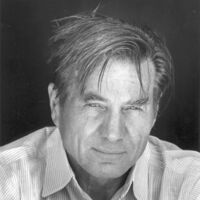
Galway Kinnell (February 1, 1927 – October 28, 2014) was an American poet. For his 1982 Selected Poems he won the Pulitzer Prize for Poetry and split the National Book Award for Poetry with Charles Wright. From 1989 to 1993 he was poet laureate for the state of Vermont. An admitted follower of Walt Whitman, Kinnell rejects the idea of seeking fulfillment by escaping into the imaginary world. His best-loved and most anthologized poems are "St. Francis and the Sow" and "After Making Love We Hear Footsteps". Born in Providence, Rhode Island, Kinnell said that as a youth he was turned on to poetry by Edgar Allan Poe and Emily Dickinson, drawn to both the musical appeal of their poetry and the idea that they led solitary lives. The allure of the language spoke to what he describes as the homogeneous feel of his hometown, Pawtucket, Rhode Island. He has also described himself as an introvert during his childhood. Kinnell studied at Princeton University, graduating in 1948 alongside friend and fellow poet W.S. Merwin. He received his master of arts degree from the University of Rochester. He traveled extensively in Europe and the Middle East, and went to Paris on a Fulbright Fellowship. During the 1960s, the Civil Rights Movement in the United States caught his attention. Upon returning to the US, he joined CORE (Congress of Racial Equality) and worked on voter registration and workplace integration in Hammond, Louisiana. This effort got him arrested. In 1968, he signed the “Writers and Editors War Tax Protest” pledge, vowing to refuse tax payments in protest against the Vietnam War. Kinnell draws upon both his involvement with the civil rights movement and his experiences protesting against the Vietnam War in his book-long poem The Book of Nightmares. From 1989 to 1993 he was poet laureate for the state of Vermont. Kinnell was the Erich Maria Remarque Professor of Creative Writing at New York University and a Chancellor of the American Academy of Poets. As of 2011 he was retired and resided at his home in Vermont until his death in October of 2014 from leukemia. Work While much of Kinnell's work seems to deal with social issues, it is by no means confined to one subject. Some critics have pointed to the spiritual dimensions of his poetry, as well as the nature imagery present throughout his work. “The Fundamental Project of Technology” deals with all three of those elements, creating an eerie, chant-like and surreal exploration of the horrors atomic weapons inflict on humanity and nature. Sometimes Kinnell utilizes simple and brutal images (“Lieutenant! / This corpse will not stop burning!” from “The Dead Shall be Raised Incorruptible”) to address his anger at the destructiveness of humanity, informed by Kinnell’s activism and love of nature. There’s also a certain sadness in all of the horror—“Nobody would write poetry if the world seemed perfect.” There’s also optimism and beauty in his quiet, ponderous language, especially in the large role animals and children have in his later work (“Other animals are angels. Human babies are angels”), evident in poems such as “Daybreak” and “After Making Love We Hear Footsteps”. In addition to his works of poetry and his translations, Kinnell published one novel (Black Light, 1966) and one children's book (How the Alligator Missed Breakfast, 1982). Kinnell wrote two elegies for his close friend, the poet James Wright, upon the latter's death in 1980. They appear in From the Other World: Poems in Memory of James Wright. References Wikipedia – http://en.wikipedia.org/wiki/Galway_Kinnell
#Americans England New US


